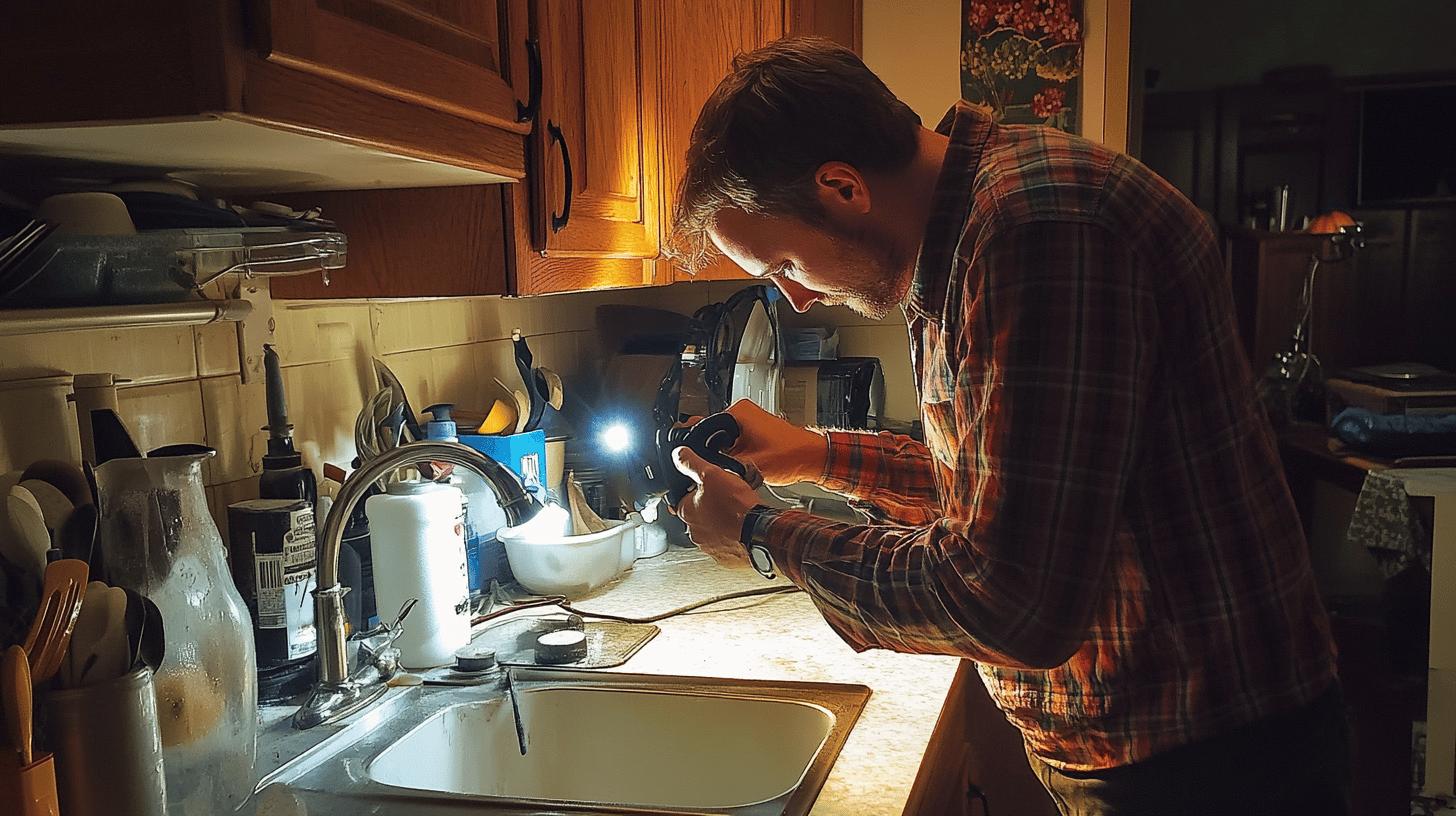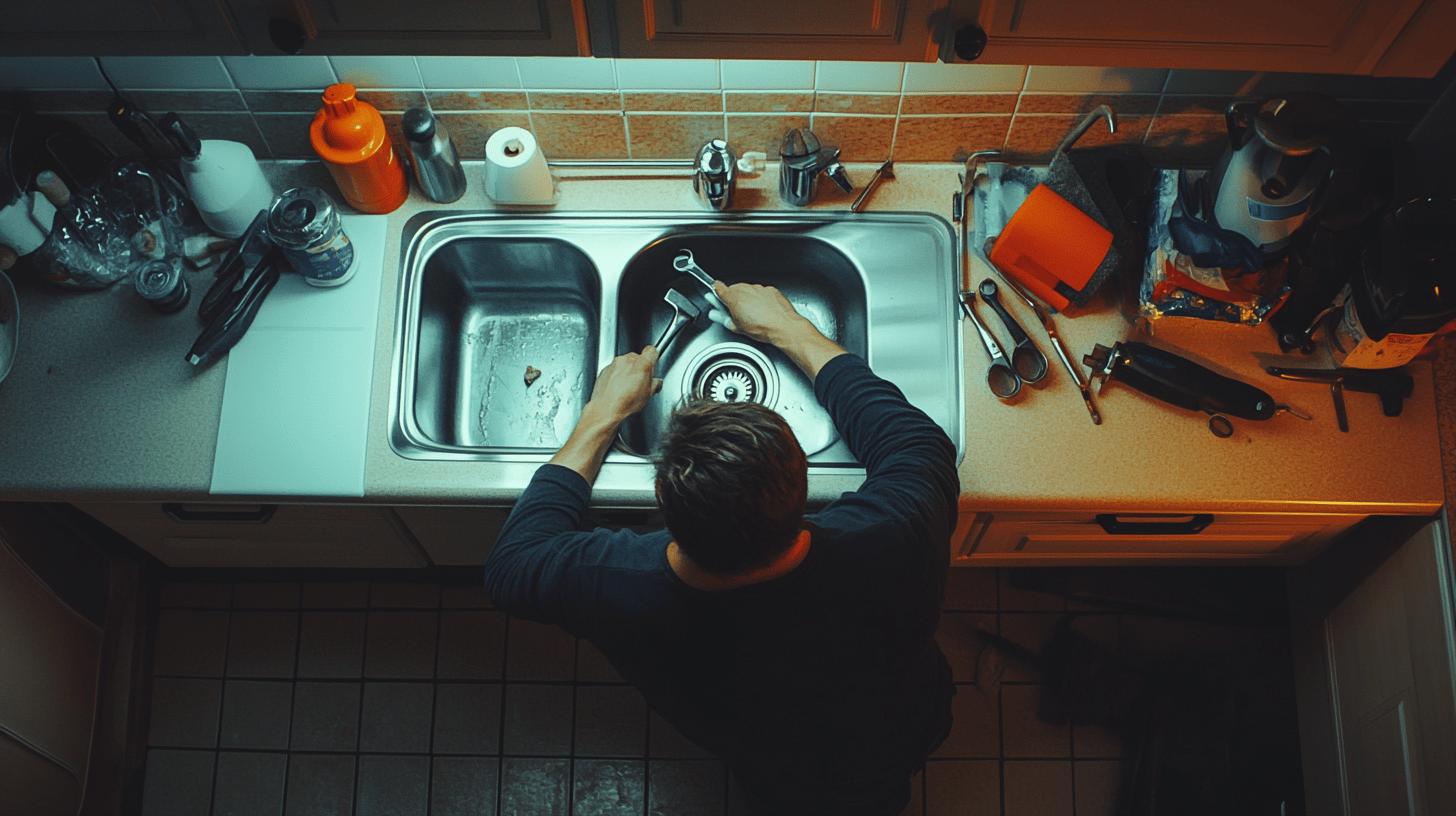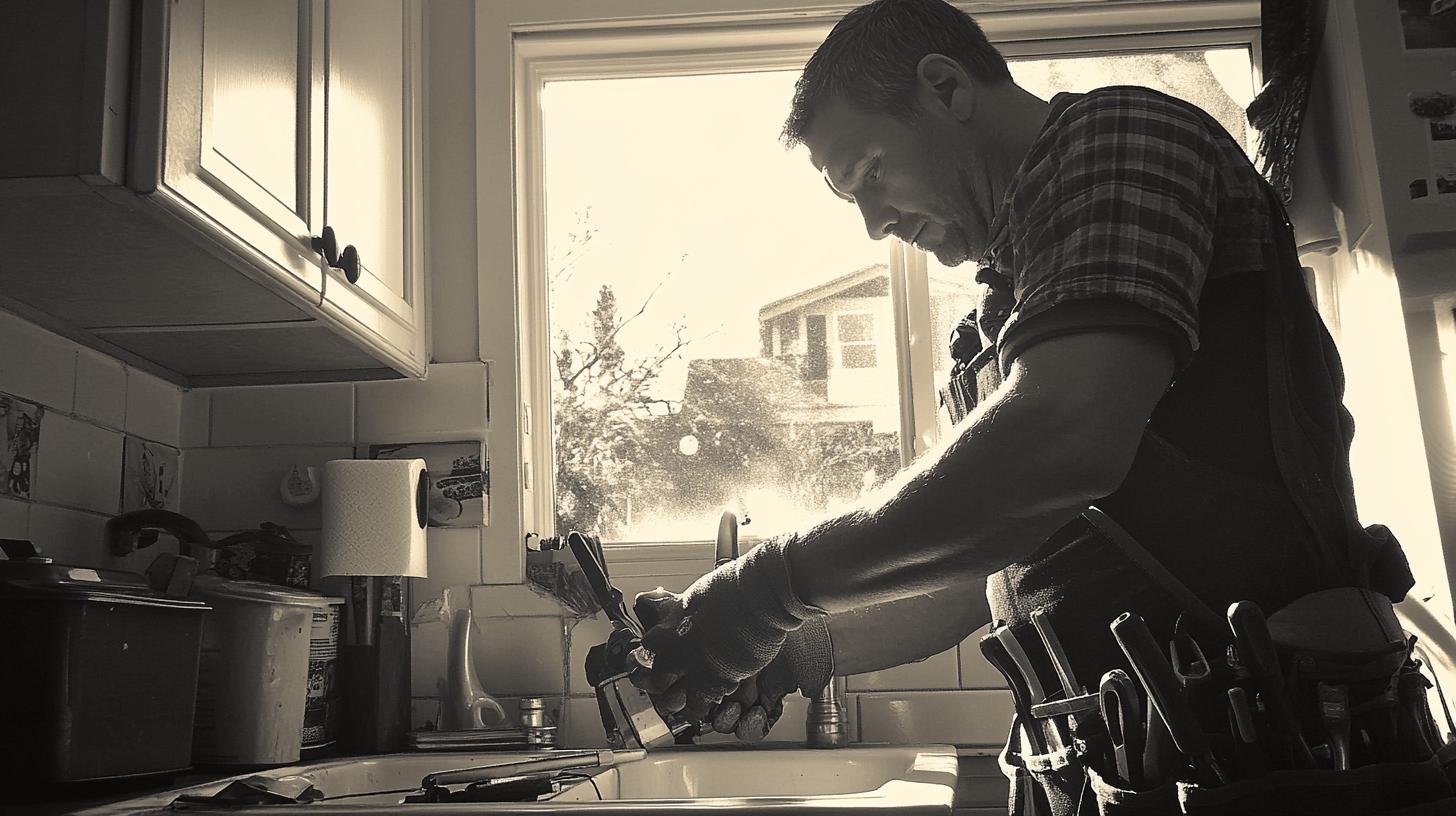TL;DR:
- Home plumbing is about 15% of a home’s value; regular maintenance is essential.
- Key benefits: prevents major issues, extends lifespan, saves money, improves efficiency, ensures clean water.
- Daily tips: check for leaks, avoid grease, use strainers, clean fixtures.
- Weekly tips: inspect under-sink pipes, flush water heater, test pressure, clean drains.
- Seasonal tasks: fall (outdoor prep), winter (prevent freezing), spring (check drains), summer (inspect for leaks).
- Complex tasks needing professionals: major repairs, water heater issues, sewer line problems.
- Common issues: clogged drains, running toilets; DIY fixes exist but complex problems require professional help.
Think maintaining your home’s plumbing is a hassle? It’s actually super important! Regular plumbing maintenance not only helps prevent leaks and clogs, but it can also protect about 15% of your home’s value. Skipping simple checks can lead to expensive emergency repairs. By putting in a little time for routine upkeep, you can make your pipes and fixtures last longer and save a lot of cash. Want to learn some easy tips to keep your plumbing in great shape? Let’s jump in!
Importance of Regular Plumbing Maintenance
Home plumbing systems make up about 15% of your home’s total value, so keeping them in good shape is really important. Regular maintenance protects this investment and ensures your home stays functional and comfortable. It helps prevent leaks, clogs, and broken pipes that can cause major water damage and expensive repairs.
Doing routine maintenance is way cheaper than fixing things in an emergency. By putting in some time for regular checkups and minor repairs, you can make your plumbing systems and fixtures last longer. This proactive approach lets you spot potential problems early, saving you time and money in the long run.
5 Key Benefits of Regular Plumbing Maintenance
- Prevents major issues
- Extends the lifespan of plumbing systems
- Saves money on repairs
- Improves system efficiency
- Ensures a clean and safe water supply
Regular plumbing maintenance keeps your home’s water system running efficiently. Clean, well-maintained pipes ensure you have a steady supply of clean and safe water for everyday use. Professional plumbers can provide expert insights and conduct thorough inspections to make sure everything is working well.
Routine checkups and timely fixes lower the chances of sudden breakdowns, giving you peace of mind and ensuring your home runs smoothly.
Essential Plumbing Maintenance Tips

Regular maintenance tasks are key to keeping your home plumbing system running smoothly. By staying on top of these tasks, you can avoid expensive repairs and ensure everything works efficiently. Just adding simple daily and weekly routines can really help extend the life of your plumbing fixtures.
Daily Plumbing Maintenance Tips
- Check for leaks
- Avoid putting grease down the drain
- Use strainers in sinks
- Run water after each use
- Clean fixtures regularly
Weekly Plumbing Maintenance Tips
- Inspect under-sink pipes
- Flush the water heater
- Test water pressure
- Clean drains with a natural solution
- Check the toilet for leaks
These daily and weekly tips are super important for keeping your home plumbing system in good shape. By regularly checking for leaks, using strainers, and doing routine inspections, you can catch small issues before they turn into big problems. Sticking to these tips will save you money on repairs and help ensure your plumbing system is reliable and efficient.
Seasonal Plumbing Maintenance Guide
Adjusting maintenance tasks for each season is key to keeping your plumbing system in great shape all year long. Each season has its own challenges, so it’s important to pay attention to specific issues that could pop up and ensure everything runs smoothly.
Fall
Get your outdoor spigots and hoses ready by draining and storing them properly. Also, make sure to clean your gutters to avoid blockages and check that your sump pumps are working as they should.
Winter
Get your outdoor spigots and hoses ready by draining and storing them properly. Also, make sure to clean your gutters to avoid blockages and check that your sump pumps are working as they should.
Spring
Make sure indoor drains are working well, and clear any bird nests from outdoor areas to help prevent flooding.
Summer
Check for leaks or damage from previous seasons, and take care of your outdoor plumbing fixtures. Keeping up with seasonal maintenance helps avoid big problems like frozen pipes, water damage, and clogs. By sticking to a seasonal schedule, you can make your plumbing last longer, save money on repairs, and ensure a steady supply of clean water. Regular checks also help you catch potential issues early, so you can fix them before they turn into bigger problems.
|Season|Maintenance Tasks|
|—|—|
|Fall|Prepare outdoor spigots and hoses, clean gutters, inspect sump pumps|
|Winter|Keep water heater at 120°F, clean gutters and sump pumps, protect pipes from freezing|
|Spring|Ensure indoor drains work properly, remove bird nests from outdoor areas|
|Summer|Check for leaks or damage from previous seasons, maintain outdoor plumbing fixtures|
DIY Plumbing Maintenance vs. Professional Services

DIY plumbing maintenance is a practical way to tackle minor issues at home. Simple tasks like checking for leaks, using plungers for small clogs, and cleaning drains can be easily handled by most homeowners. These quick activities help keep your plumbing in good shape and stop little problems from becoming big ones.
However, for more complex issues, it’s best to call in the pros. Hiring professional plumbers comes with many benefits that DIY can’t match. They provide great customer service, arrive in uniform, and use clear flat-rate pricing without extra charges. Plus, they offer convenient appointment times and in-home estimates, making it easy to fit maintenance into your schedule. Regular expert maintenance can save you time and money by preventing emergencies and keeping your plumbing system running smoothly.
5 Complex Plumbing Tasks Requiring Professional Assistance
- Major pipe repairs
- Water heater issues
- Sewer line problems
- Gas line plumbing
- Major leak detection
Professional plumbers have the skills and tools needed to tackle complex plumbing tasks safely and effectively. By trusting their expertise, you can avoid costly mistakes and ensure your plumbing system lasts longer.
Common Plumbing Problems and DIY Fixes
Common plumbing issues in homes include clogged drains, running toilets, low water pressure, dripping faucets, and strange noises. These problems can mess up your daily routine and lead to bigger headaches if you don’t fix them quickly. By understanding these common issues and how to deal with them, you can save both time and money.
Common Plumbing Problems
- Clogged drains
- Running toilets
- Low water pressure
- Dripping faucets
- Strange noises
DIY Fixes
- Use a plunger or snake for clogs
- Adjust the flapper valve for running toilets
- Clean aerators for low water pressure
- Replace washers for dripping faucets
- Inspect and tighten loose pipe fittings for strange noises
DIY fixes can work for minor plumbing issues, but it’s important to know when to call in the pros. Complex problems like water heater failures, gas line issues, and major leaks need a licensed plumber’s expertise. Trying to handle these on your own without the right knowledge or tools can cause even more damage and lead to higher repair bills. For serious plumbing tasks, always get a professional to ensure safety and quality.
Final Words
To keep your home’s plumbing system in good shape, regular checkups and preventive measures are key. Routine maintenance is cost-effective, helping you avoid leaks, clogs, and broken pipes. Sticking to essential tips and adjusting for seasonal needs will keep your system efficient and lasting longer. While you can handle some tasks yourself, complex issues are best left to professionals. By addressing common problems early and combining DIY efforts with expert help, you’ll ensure your plumbing runs smoothly. Remember these strategies to maintain your plumbing system and enjoy a stress-free home.
FAQ
How do you maintain a piping system?
Maintaining a piping system involves regular inspections for leaks, using strainers to prevent clogs, flushing the water heater annually, and knowing the location of the main water shut-off valve in case of emergencies.
What is the most common plumbing item to fail in a residential home?
The most common plumbing item to fail is the water heater. Regular maintenance, like flushing the tank, can help extend its lifespan and efficiency.
How long does a plumbing system last in a house?
A plumbing system in a house can last 20-50 years depending on the materials used and how well it is maintained. Regular inspections can help identify any issues early.
What does a plumbing maintenance checklist include?
A plumbing maintenance checklist includes checking for leaks, inspecting under-sink pipes, cleaning drains, testing water pressure, and flushing the water heater to remove sediment buildup.
What are plumbing maintenance services?
Plumbing maintenance services involve professional inspections, leak detection, pipe cleaning, system efficiency checks, and preventive measures to avoid major plumbing issues.
What is a plumbing maintenance plan?
A plumbing maintenance plan is a scheduled routine for inspecting and maintaining your plumbing system. It includes tasks like checking for leaks, inspecting pipes, and cleaning drains.

